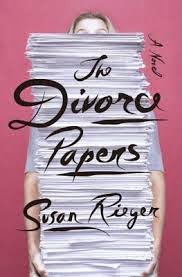"The Divorce Papers" by Susan Rieger
Twenty-nine-year-old Sophie Diehl loves her job as a criminal law associate at a New England firm. All of her clients are behind bars and it means very little personal contact, which for her is perfect. But one weekend, all of the big partners are away and Sophie must do an intake interview for a woman looking for a divorce lawyer. Sophie agrees to the interview but doesn’t expect that the client will end up requesting her to take on the case.
Mia Meiklejohn Durkheim was served divorce papers from her husband while dining at a popular restaurant. A Mayflower descendent, she is shocked to find out that her marriage of eighteen years is over. Even more, she is shocked that her husband, Dr. Daniel Durkheim, Chief of the Department of Pediatric Oncology, is out for blood. He wants custody of their ten-year-old daughter Jane and to leave Mia with very little while he starts fresh with one of his colleagues.
Told only through personal correspondence, office e-mails and memos, legal documents, and scholarly articles, The Divorce Papers by Susan Rieger tells the story of what happens between two people when their marriage fails.
I gave this book three out of five stars and here is why I placed it smack dab in the middle. I loved the plot and the story, two well-off people fighting over every piece of the divorce agreement and a lawyer who feels completely out of her depth handling it all. The character of Mia was wonderful to me, I could totally picture her in my mind, and it was great to see her strength and determination against the difficulties she was having. Sophie was a bit more difficult for me to get a picture of though. I also liked the addition of other people such as Fiona, a partner at the firm, and how their stories take you beyond the divorce and show you the politics of privilege and gender at a law firm.
But I absolutely disliked the format. I’m not against a novel being written in epistolary form, but I don’t think it suited this story well. The characters didn’t develop enough for me, some of the emotion was lost, and it was just too heavy on the legal documents. I found myself flipping past many pages because I didn’t care to read statutes, past cases, or financial documents. It’s obvious from reading that Rieger is a lawyer and is very knowledgable, but it just didn’t work for me as a reader.
Having read other reviews of the book on Goodreads, it seems that the opinion on this book is very divided. Some people love it, some people don’t like it at all. Much of the dislike comes from the inclusion of all the legal papers. If you think it won’t bother you, or you don’t mind flipping through much of the book, then give the book a try. It’s hard to tell which side you will fall on until you read the book.
I received a copy of this book courtesy of the publisher through Netgalley.




Comments
Post a Comment